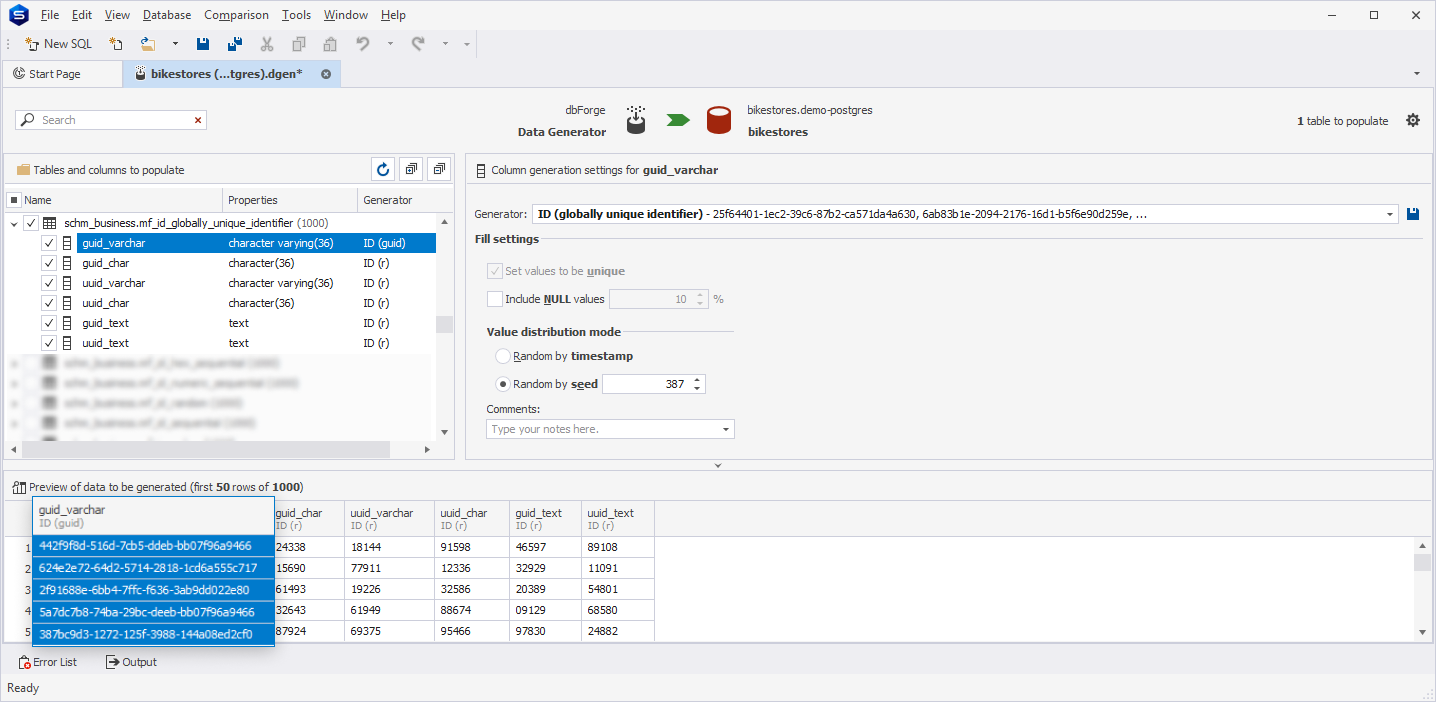ID generator
The ID generator produces unique identifiers for rows in a database table. These IDs can be used to distinguish records and maintain database integrity.
The ID generator includes the following generators:
- ID (sequential)
- ID (random)
- ID (numeric sequential)
- ID (hexadecimal sequential)
- ID (composite sequential)
- ID (globally unique identifier)
ID (sequential) generator
The ID (Sequential) generator creates unique, sequential numeric identifiers for rows in a database table. These identifiers increase incrementally and are commonly used as primary keys or other unique fields to ensure each record can be distinguished from others.
Generator properties
The table provides key details about the generator, including the short name, sample of the generated data, the supported data types, and whether it is specific to a particular country.
| Short name | Example of generated data | Data type matching | Country-specific |
|---|---|---|---|
| ID (s) | 1, 2, 3, 4, …, 9, 10, 11, 12, … | bigint integer smallint double precision |
Default |
Matching rules
The generator can be assigned to a column whose name is ‘ID’, regardless of the table name.
Configure additional options
The tool allows you to specify the minimum and maximum values. The default range is from 1 to 9223372036854775807.
Note
The default maximum value varies depending on the data type.
Preview of the column data generated by the ID (sequential) generator
The screenshot shows the maximum value for the bigint data type. Note that the maximum values for other data types may vary.
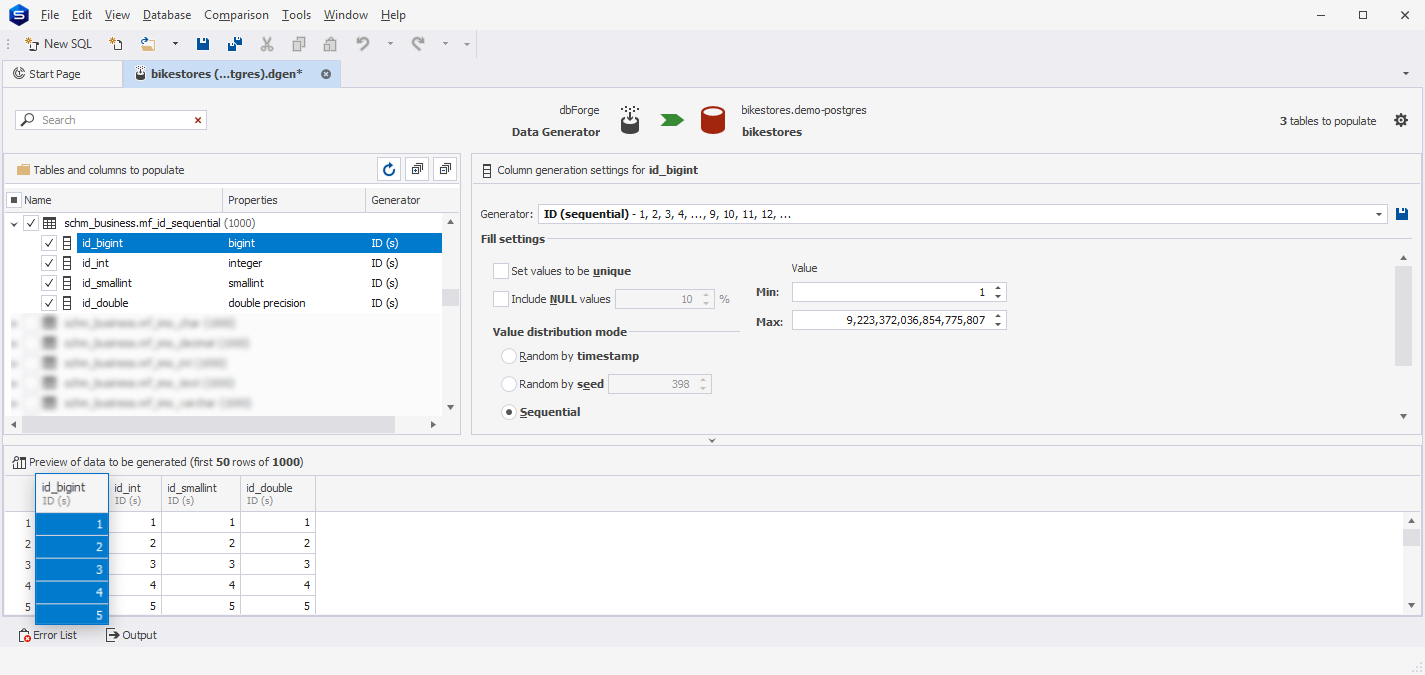
ID (random) generator
The ID (random) generator creates unique identifiers, account numbers or codes, or numeric values, such as serial or ticket numbers, for database records using randomization rather than sequential order.
Generator properties
The table provides key details about the generator, including the short name, sample of the generated data, the supported data types, and whether it is specific to a particular country.
| Short name | Example of generated data | Data type matching | Country-specific |
|---|---|---|---|
| ID (r) | 54470, 16912, 43814, 06728, 36017, 82433, 95664, … | character varying character text |
Default |
Matching rules
The generator can be assigned to a column whose name is ‘ID’, ‘ACC’, or ‘NUM’, regardless of the table name.
Configure additional options
The generator produces data based on a regular expression. Since it is built on the RegExp generator, see Regular Expression generator to customize settings and understand the correct usage of syntax.
Preview of the table data generated by the ID (random) generator
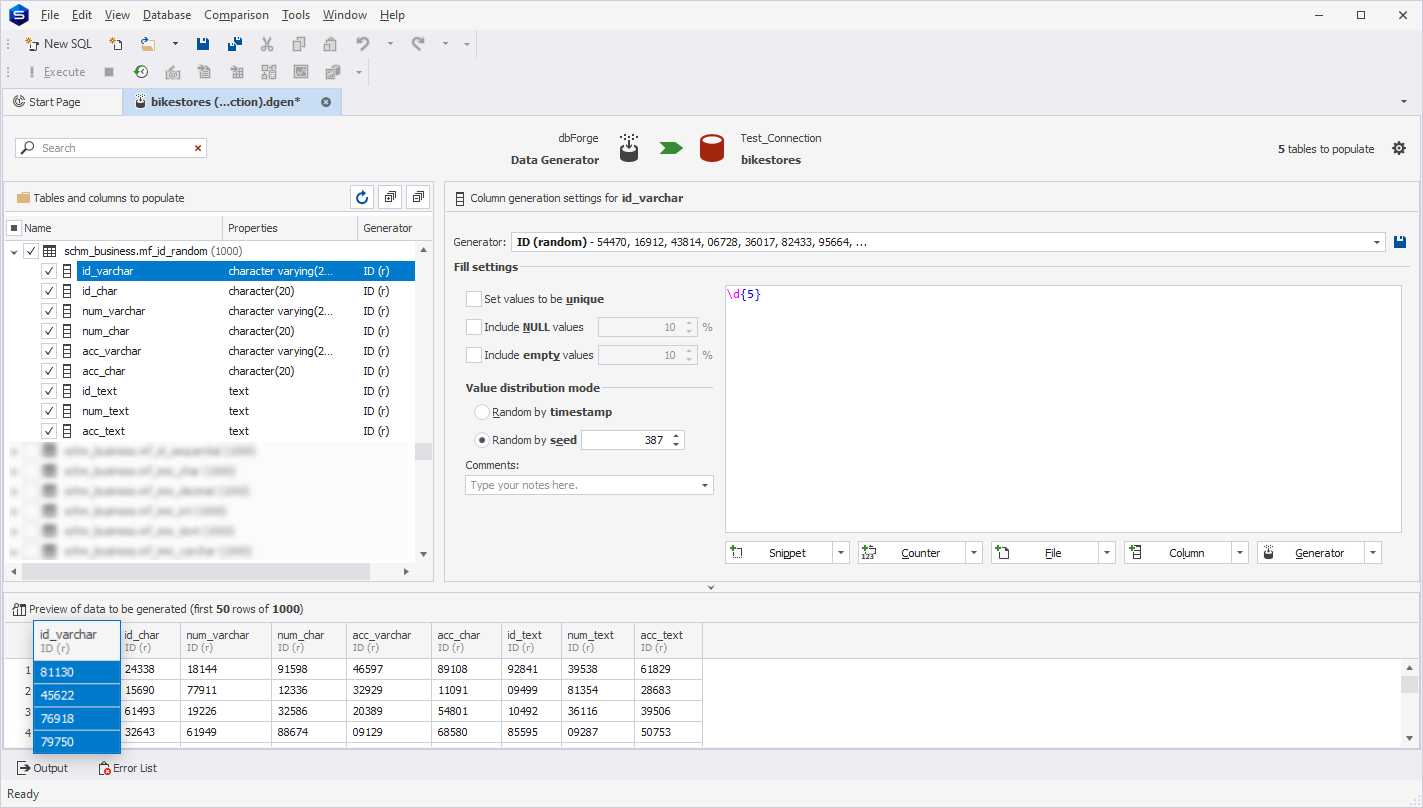
ID (numeric sequential) generator
The ID (numeric sequential) generator creates a series of unique, sequential numeric identifiers.
Generator properties
The table provides key details about the generator, including the short name, sample of the generated data, the supported data types, and whether it is specific to a particular country.
| Short name | Example of generated data | Data type matching | Country-specific |
|---|---|---|---|
| ID (ns) | 00000, 00001, 00002, …, 99997, 99998, 99999 | character varying character text |
Default |
Matching rules
The generator can be assigned to a column whose name is ‘ID’, ‘ACC’, or ‘NUM’, regardless of the table name.
Configure additional options
The generator produces data based on a regular expression. Since it is built on the RegExp generator, see Regular Expression generator to customize settings and understand the correct usage of syntax.
Preview of the column data generated by the ID (numeric sequential) generator
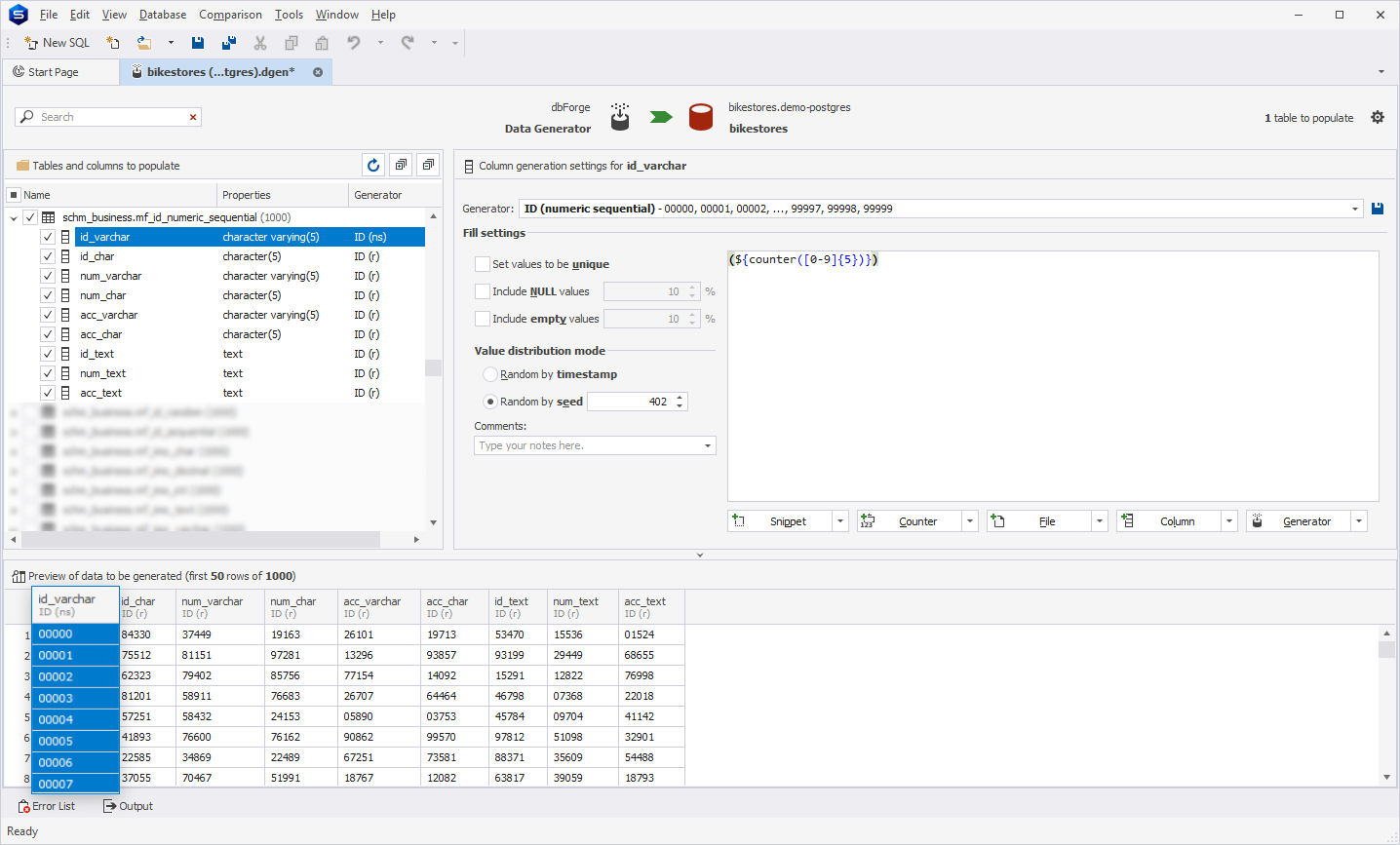
ID (hexadecimal sequential) generator
The ID (hexadecimal sequential) generator produces unique identifiers in hexadecimal format that follow a sequential order.
Generator properties
The table provides key details about the generator, including the short name, sample of the generated data, the supported data types, and whether it is specific to a particular country.
| Short name | Example of generated data | Data type matching | Country-specific |
|---|---|---|---|
| ID (hs) | 00000, 00001, 00002, …, FFFFD, FFFFE, FFFFF | character varying character text |
Default |
Matching rules
The generator can be assigned to a column whose name is ‘ID’, ‘ACC’, or ‘NUM’, regardless of the table name.
Configure additional options
The generator produces data based on a regular expression. Since it is built on the RegExp generator, see Regular Expression generator to customize settings and understand the correct usage of syntax.
Preview of the column data generated by the ID (hexadecimal sequential) generator
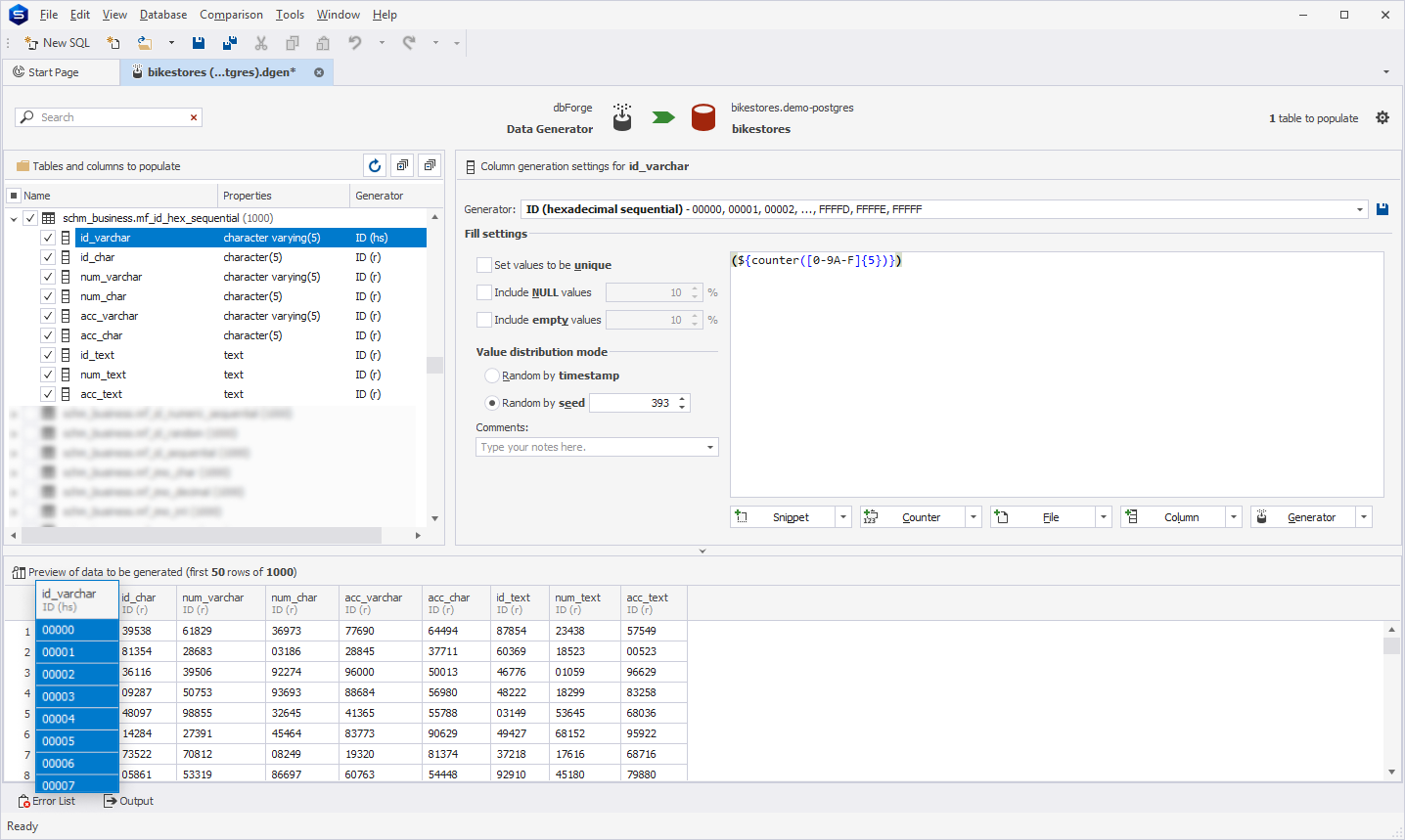
ID (composite sequential) generator
The ID (composite sequential) generator produces unique identifiers that combine multiple elements or fields (e.g., numeric, alphanumeric, or other data types), with each part of the identifier following a sequential pattern.
Generator properties
The table provides key details about the generator, including the short name, sample of the generated data, the supported data types, and whether it is specific to a particular country.
| Short name | Example of generated data | Data type matching | Country-specific |
|---|---|---|---|
| ID (cs) | ID000, ID001, ID002, …, ID997, ID998, ID999 | character varying character text |
Default |
Matching rules
The generator can be assigned to a column whose name is ‘ID’, ‘ACC’, or ‘NUM’, regardless of the table name.
Configure additional options
The generator produces data based on a regular expression. Since it is built on the RegExp generator, see Regular Expression generator to customize settings and understand the correct usage of syntax.
Preview of the column data generated by the ID (composite sequential) generator
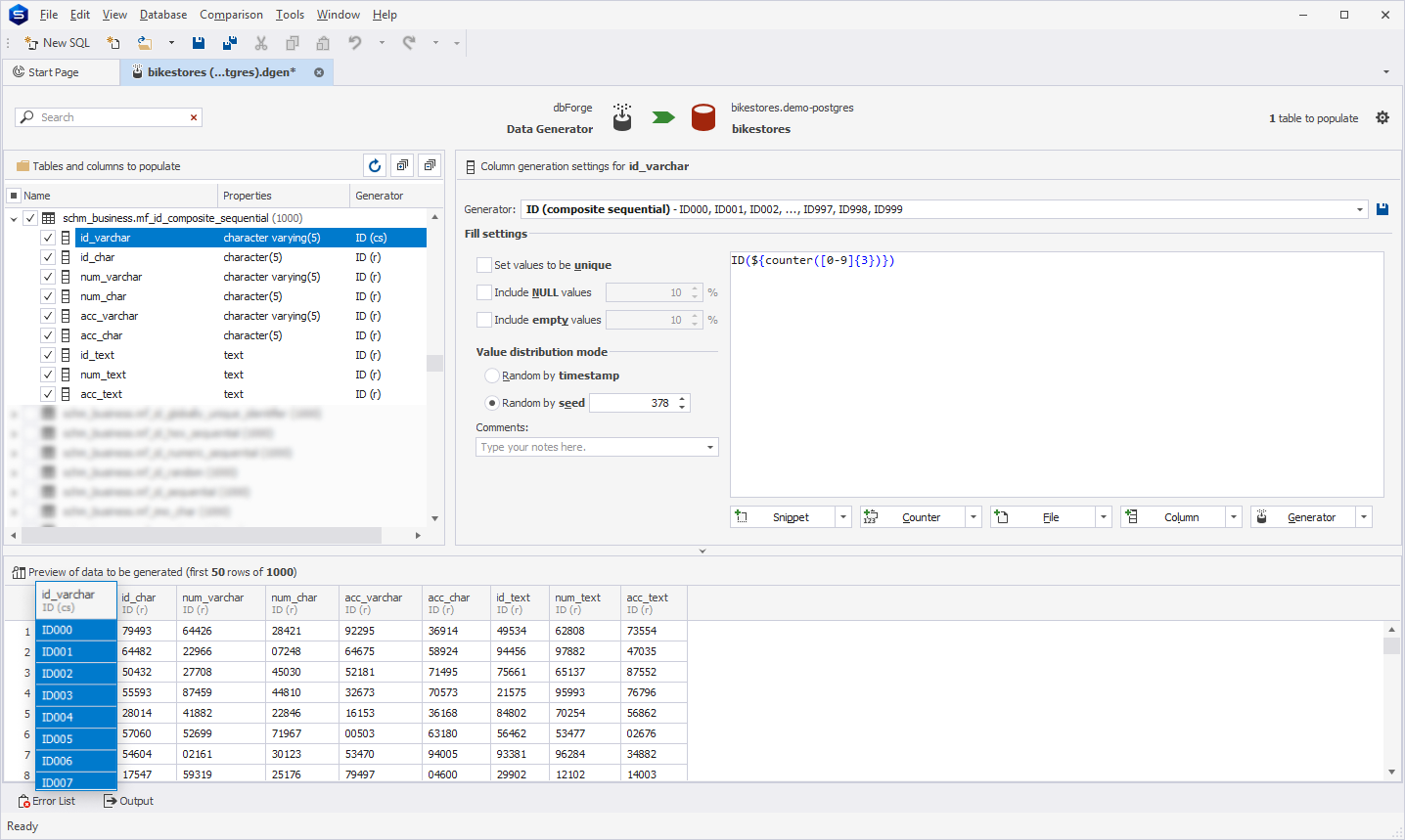
ID (globally unique identifier) generator
The ID (globally unique identifier) generator creates a unique identifier that is guaranteed to be globally unique across different systems and instances. This identifier is typically represented as a UUID (Universally Unique Identifier) or GUID (Globally Unique Identifier).
Generator properties
The table provides key details about the generator, including the short name, sample of the generated data, the supported data types, and whether it is specific to a particular country.
| Short name | Example of generated data | Data type matching | Country-specific |
|---|---|---|---|
| ID (guid) | 25f64401-1ec2-39c6-87b2-ca571da4a630, 6ab83b1e-2094-2176-16d1-b5f6e90d259e, … | character varying character text |
Default |
Matching rules
The generator can be assigned to a column whose name is ‘GUID’ or ‘UUID’, regardless of the table name.
Configure additional options
The generator produces data based on a regular expression. Since it is built on the RegExp generator, see Regular Expression generator to customize settings and understand the correct usage of syntax.
Preview of the column data generated by the ID (globally unique identifier) generator
